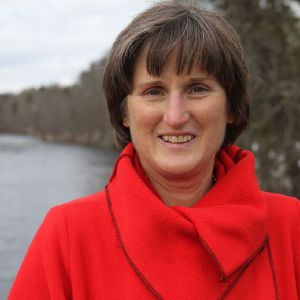Opinion: Holding on to hope

A photo taken by the author in St. Petersburg, Florida. Jean Stimmell
| Published: 03-02-2025 6:00 AM |
Jean Stimmell is a retired stone mason and psychotherapist living in Northwood. He blogs at jeanstimmell.blogspot.com and jstim.substack.com.
How do I remain hopeful despite the travails of old age, mounting infirmity and the ransacking of my country by our 21st-century Attila the Hun and his Machiavellian savant sidekick?
I think being old is a plus, a topic I explored in my recent column, “Meeting at the Edge.” Opinion columnist M. Gessen suggests much the same thing in a recent New York Times piece exploring how Ukrainian poets have kept the faith during their country’s agonizing three-year war with Russia.
One of the oldest of these poets, Maria Galina, 66, has posted daily updates since the first day of the Russian invasion. She begins her dispatches with the hopeful salutation: “New day, new morning.”
Galina attempts to convince Gessen that she can envision a hopeful future because she used to write science fiction. However, Gessen contends it is because she is a poet practicing “the art of intimations and intuitions,” which enables some writers to foresee what has not yet happened.
Gallina remains ever-hopeful, but don’t mistake her stance for optimism. As Rebecca Solnit points out — also a supremely gifted wordsmith in her sixties — hope has nothing to do with optimism.
In Guernica Magazine, she writes: “Optimism says that everything will be fine no matter what, just as pessimism says that it will be dismal no matter what. Hope is a sense of the grand mystery of it all, the knowledge that we don’t know how it will turn out, that anything is possible.” And she is right.
Article continues after...
Yesterday's Most Read Articles
 Skeletal remains across from state prison identified as Concord fugitive
Skeletal remains across from state prison identified as Concord fugitive
 Man dies in RV fire in parking lot of Concord’s Steeplegate Mall
Man dies in RV fire in parking lot of Concord’s Steeplegate Mall
 25-year-old Concord man identified as Steeplegate Mall RV fire victim
25-year-old Concord man identified as Steeplegate Mall RV fire victim
 ‘Field of Dreams’ to ‘a dump’ – What golfers have to say about Concord’s plans to rebuild the Beaver Meadow clubhouse
‘Field of Dreams’ to ‘a dump’ – What golfers have to say about Concord’s plans to rebuild the Beaver Meadow clubhouse
 ‘New Hampshire is just going to embarrass itself’: Former Child Advocate warns against proposed office cuts
‘New Hampshire is just going to embarrass itself’: Former Child Advocate warns against proposed office cuts
 N.H. mulls immigration bill to ban sanctuary policies and overrule local control
N.H. mulls immigration bill to ban sanctuary policies and overrule local control
Knowing that anything is possible fuels my hope. I agree with Buddhists who are aware that the future is fundamentally uncertain because life is constantly changing. It is inescapably true: None of us knows what will happen in the next second, let alone in the next year.
Nevertheless, we are in deep denial about how uncertain our lives are.
We have spent our whole human evolution doing the opposite: chasing absolute certainty that we are safe from danger. The impulse is understandable. Life used to be brutal; going to sleep at night, we were terrified that a sabertooth tiger would eat us before morning. Ukrainians have similar fears that a Russian missile attack will blow them up in their sleep.
In those circumstances, psychologically speaking, it makes sense to yearn for a safe harbor free from mortal danger.
But for most of us in the U.S., we face no such peril. Yet, that doesn’t stop politicians from creating such primal fear by scaring us with false existential threats, attempting to get us to vote for them to fix horrific situations that they concoct out of whole cloth. For instance, it’s pure propaganda that an army of illegal aliens is invading our country, intent on raping and killing us. It’s false, no matter how many times Trump repeats it.
In today’s world, our quest for certainty is so over the top it’s become pathological, limiting our horizons, creating irrational anxiety, and worst of all, destroying our ability to have hope for the future. Here’s a famous quote that says it all, attributed to Erich Fromm, a wise psychologist and philosopher from the middle of the last century, whose work I adore:
“The quest for certainty blocks the search for meaning. Uncertainty is the very condition to impel man to unfold his powers.”
Among the few who understand uncertainty today are artists, like the poet from Ukraine, who practice the arts of intimation and intuition. These creative individuals understand that uncertainty should be embraced, not feared. They remind us that, as Tal Gur, chief editor of Elevate Society, writes in his interpretation of Erich Fromm’s quote, “grappling with the unknown, navigating uncertainty, and embracing change can unlock our full potential and help us find deeper meaning in our lives.”
We should all aspire to follow in the footsteps of the seasoned Ukrainian poet Maria Galina, who can never lose hope because every rotation of the earth is a “New day, new morning.”







 Opinion: Concord officials: Can we sit and talk?
Opinion: Concord officials: Can we sit and talk? Opinion: Trump versus the U.S. Constitution
Opinion: Trump versus the U.S. Constitution Opinion: Protect our winters!
Opinion: Protect our winters!
